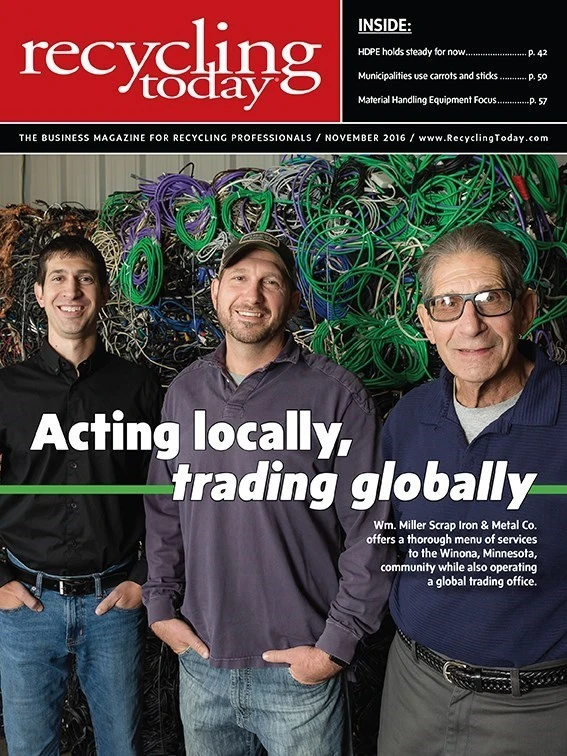Paper recyclers who attended the 2016 Paper & Plastics Recycling Conference in Chicago Oct. 19-21 recognized the need for updated recovered fiber grade specifications, yet some suppliers questioned the lack of news grades during a session on paper specification revisions hosted by the Paper Stock Industries (PSI) Chapter of the Institute of Scrap Recycling Industries (ISRI), Washington.
The recovered fiber specifications approved by the ISRI board of directors in April 2016 went into effect quietly in June 2016, said moderator Bill Moore, president of Moore & Associates, an Atlanta-based consulting firm for the paper and paper recycling industry.

He recognized the changes will take hold in time. The deleted specifications—old newspapers (ONP) grades Nos. 6, 7 and 8 and mixed paper grades Nos. 1, 2 and 3—officially expire Dec. 31, 2016.
As a result of these revisions, Boston-based research firm RISI has changed the grades it reports through its PPW Yellow Sheet. As of October 2016, RISI has introduced domestic and export market pricing for the mixed paper No. 54 grade, with two years of retroactive price history matching that of mixed paper No. 2. RISI also has introduced domestic and export pricing for sorted residential papers (SRP) No. 56, with two years of retroactive price history matching that of ONP No. 8, and has discontinued pricing for ONP Nos. 2 and 8. RISI says it will not introduce pricing for sorted clean news (SCN) No. 58.
Johnny Newsome, director, global mill supply and trade sales, at Sonoco Recycling, pointed out how the newly revised SRP No. 58, which replaces the ONP No. 8 grade, does not include the word “news” in the title.
Newsome said neither of the new PSI specifications describes the more than 1 million tons of ONP currently produced at U.S. material recovery facilities (MRFs) for sale domestically and globally. He said he was puzzled by this missing piece.
“It’s confusing for us because [the PSI revisions] didn’t recognize news in the grade,” Newsome said. “It sounds more like mixed paper.”

Sonoco Recycling recently set up a major contract for ONP and did not use PSI’s specifications, Newsome said. Rather, the company created its own specification and referred to it as ONP.
When it comes to future contracts, Newsome said he does not foresee supply managers using the SRP specification. “I don’t see us calling mills in Asia and saying we have SRP; we’ll be saying ONP for sure,” Newsome said.
Each mill has its own recipe and process for how it buys and sells, said Kari Talvola of Burlingame, California-based Fibre Trade Inc. and PSI’s specifications committee chair.

She said “a lot of people” have been working to ensure the recovered fiber specifications correspond to what MRFs are actually producing.
In addition, Talvola said, the committee heard input from members and nonmembers at its second annual Specifications Summit Feb. 3-5, 2016, in New Orleans. However, she said PSI has received less feedback on news and mixed paper specification revisions than on OCC revisions.
Speaker Steve Wilson, director, commodity sales, Waste Management Recycling Services, Houston, said mill consumers and suppliers know when they’re selling off-specification. “No. 8 news has always been a problem grade and never really existed,” Wilson said.
Rob Barnwell of Kousa International, Los Angeles, said new specifications were necessary. While he said it is possible to “get really clean ONP out of single-stream” MRFs, few true bales of ONP No. 8 are being made.
“You have to have somewhere to start,” Barnwell said, adding, “Specifications always will be an important part of discussions.”

Explore the November 2016 Issue
Check out more from this issue and find your next story to read.
Latest from Recycling Today
- Phoenix Technologies closes Ohio rPET facility
- EPA selects 2 governments in Pennsylvania to receive recycling, waste grants
- NWRA Florida Chapter announces 2025 Legislative Champion Awards
- Goldman Sachs Research: Copper prices to decline in 2026
- Tomra opens London RVM showroom
- Ball Corp. makes European investment
- Harbor Logistics adds business development executive
- Emerald Packaging replaces more than 1M pounds of virgin plastic





